How are swimming pools heated? This question floats around your brain and leaves you unable to sleep or think about anything else. You want to know how they are heated, but just can’t seem to get the answers you need.
And without the answers, how are you to heat your pool? You can’t spend your days swimming in a cold pool!
But no more! We have the answers for you. Just keep reading to find out how swimming pools are heated and everything you need to know about swimming pool heaters.
How Are Most Swimming Pools Usually Heated?
Let’s get straight into it! Swimming pools are usually heated using gas or electric heaters. The type of heater depends on the size of the pool and the amount of water in it. Gas heaters burn natural gas, propane or oil to generate heat.
Electric heaters run off electricity. Both types use an electrical power cord to connect them to a source of AC current.
Now that we have established how they are heated, let’s look at pool heaters in closer detail.
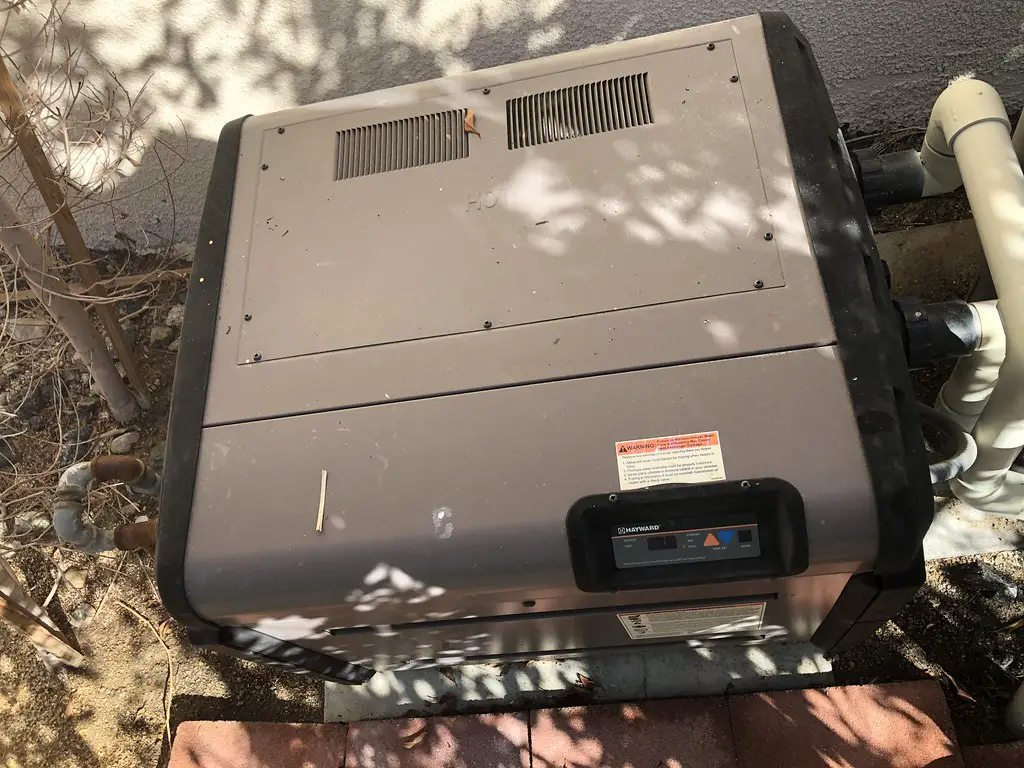
Types Of Swimming Pool Heaters
There are a few different types of swimming pool heaters you should be aware of. Let’s take a look at them in closer detail.
1. Electric Heaters
Electric heaters use electricity to heat a pool. As they provide the most heat for the least amount of energy used, they are used primarily for small indoor as well as outdoor swimming pools.
They allow for more precise temperature control than do gas heaters, but require more frequent maintenance because chlorine can corrode the heating elements if not properly maintained.
An electric heater has no moving parts that must be replaced when damaged by corrosion.
2. Gas Heaters
These are the primary form of pool heating found in larger residential pools (up to 10,000 gallons) and commercial pools with depths greater than 12 feet.
A water pump circulates the pool water through piping containing several gas-fired heat exchangers, located at the bottom of the pool, which transfers heat from the circulating water into the air surrounding the pool.
Heat is then transferred back to the water as needed to maintain the desired temperature. Most commercial pools have one main gas heater, while many homeowners install two smaller units, each for a different side of their pool.
One unit may remain idle during part of the day when the pool is empty and only heats a portion of the pool. In large pools, two separate systems serve multiple zones within the pool to minimize wasted heat loss to the exterior environment.
Solar Pool Heater System: Solar panels mounted above the roof of the dwelling house supply solar heat to the heating system.
As the sun moves across the sky during its daily cycle, it heats the outer surface of the heat storage tank until it reaches a maximum temperature. When the sun sets, the heat stored in the tank gradually dissipates back into the atmosphere.
This type of pool heating system typically uses a gas-fired boiler that heats a secondary heat transfer fluid such as hot water. The heated water transfers its heat to the pool after passing through an expansion tank.
A common problem is that the temperature of the water being circulated by the pump will decrease due to evaporation losses as soon as the liquid enters the evaporative cooler.
For this reason, a drain valve should be installed on the lowest point of the coil, so that any water lost by dripping does not return directly to the pool.
Another problem with solar pool heating systems is that they are expensive to buy and operate; often costing around $20,000-$30,000 and needing 2 acres of land to accommodate the solar panel array.
This type of pool heater works best in remote areas where there is sunlight for 7 months of the year. It also requires a high level of skill to design and install the equipment correctly.
3. Solar Heaters & Other Methods
Other pool heating methods include solar pool covers or solar blankets, underground piping, electrical systems, and propane tanks.
Underground piping is relatively simple but costly. Electrical systems are highly reliable but require constant monitoring and maintenance.
Propane tanks are easy to install but dangerous to store and transport. Additionally, these systems need special permits in some municipalities.
Therefore, none of these options offer total freedom, simplicity, or safety, nor do they provide a wide range of operating temperatures over 24 hours.
Solar heating options are often one of the best options when it comes to finding a heater for an above ground pool.
Benefits Of Swimming Pool Heaters
- They provide free energy during the swimming season.
- They do not require any maintenance or electricity.
- They increase the value of your home if you have an inground pool.
- Electric power is the most common type of energy used by swimming pools. It heats water very fast but requires more maintenance than other options.
- Natural gas is another popular choice for heating pools because it heats them faster than electricity and doesn’t require any maintenance. Both types of systems work well for pools that aren’t used often.
How Does A Swimming Pool Heat Pump Work?
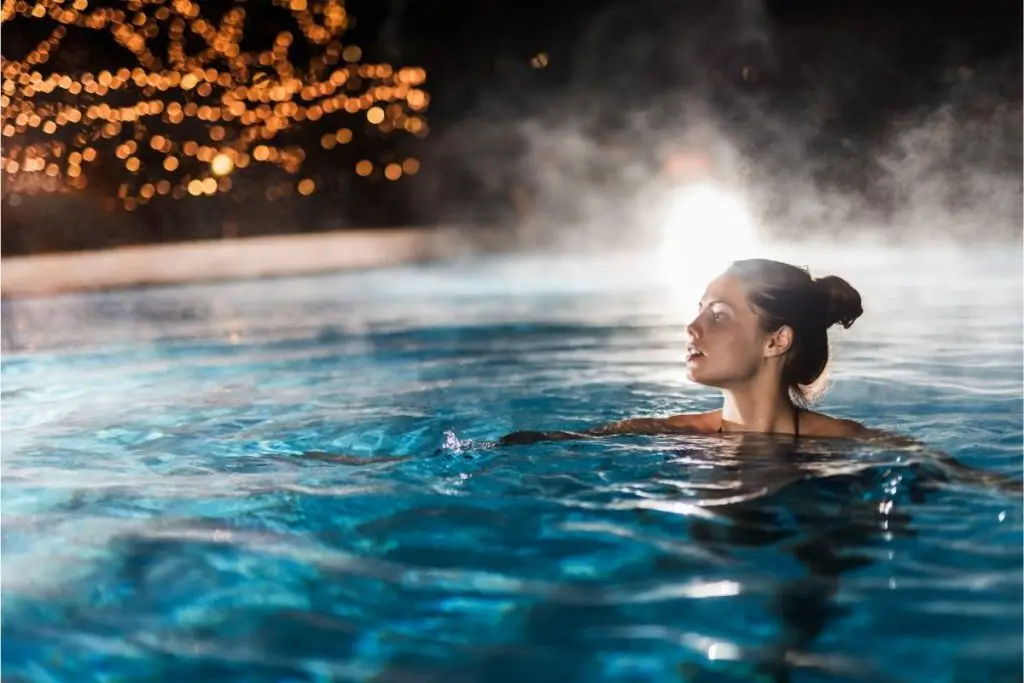
A typical pool heat pump system uses a circulation pump to circulate the water around the pool. The pump sucks up the water from the bottom of the pool and then pushes it back down into the pool.
The pump also keeps the water moving by pushing it around the sides of the pool. The pump does this using a motor that spins an impeller inside the pump.
As the water moves through the pump, it picks up heat from the surrounding environment. This causes the water to become hotter than normal.
When the water reaches the top of the pump, it goes back down to the bottom of the pool. The water that comes out of the pump is warmer than when it went in. Read our full post on how a pool heat pump works for a deeper dive!
Efficiency Of Swimming Pool Heat Pumps
Higher efficiency means lower energy costs. Scroll compressors are used in heat pumps, but they are more expensive than reciprocating compressors because they require more maintenance.
Heat pumps are very efficient. They use less energy than other types of heating systems. However, they do cost more upfront.
You should also consider how big your pool is. A bigger pool means a larger heat pump. This will increase the price of the unit.
Pool heaters are sized based on the surface area of the swimming pool and the difference between pool and ambient temperature. Wind speed affects how much energy is needed to heat the water.
Humidity level affects how much heat is required to maintain the desired temperature range.
Cooler nighttime temperatures mean less heat is needed to warm the water. A standard-sized pool requires about 10-15% more heating power than a smaller pool.
For example, a 75,000 BTU pool needs about 8.7 hp and a 100,000 BTU pool requires 12.6 hp.
To heat a swimming pool, you need an amount of energy equal to the area of the pool times the difference between your desired water temperature and the water temperature multiplied by 60.
Heat pump efficiency is measured by the coefficient of thermal performance (CTP), or COP. CTP ranges from 4.0 to 6.5, which translates into efficiency of 400%-600%.
For every unit of electricity used to run the compres犀利士 sor, you’ll get about four units of heat output.
Temperature Differences Across The U.S That Affect Pool Heating
Let’s take a look at different states in the US and how the temperatures differ!
In Miami, the temperature drops dramatically during the winter months. During the summer, the temperature rises.
In Phoenix, the temperature falls significantly during the coldest part of the year.
In Dallas, the temperature remains relatively constant throughout the year.
In Atlanta, the temperature drops during the coldest time of the year.
In Los Angeles, the temperature remains relatively stable throughout the year.
In Kansas City, the temperature drops during the winter months.
In New York, the temperature drops dramatically throughout the entire year.
Chicago has the highest cost per square foot.
Denver is the cheapest. Using a heat pump saves money over time because it uses less electricity than other types of pool heaters.
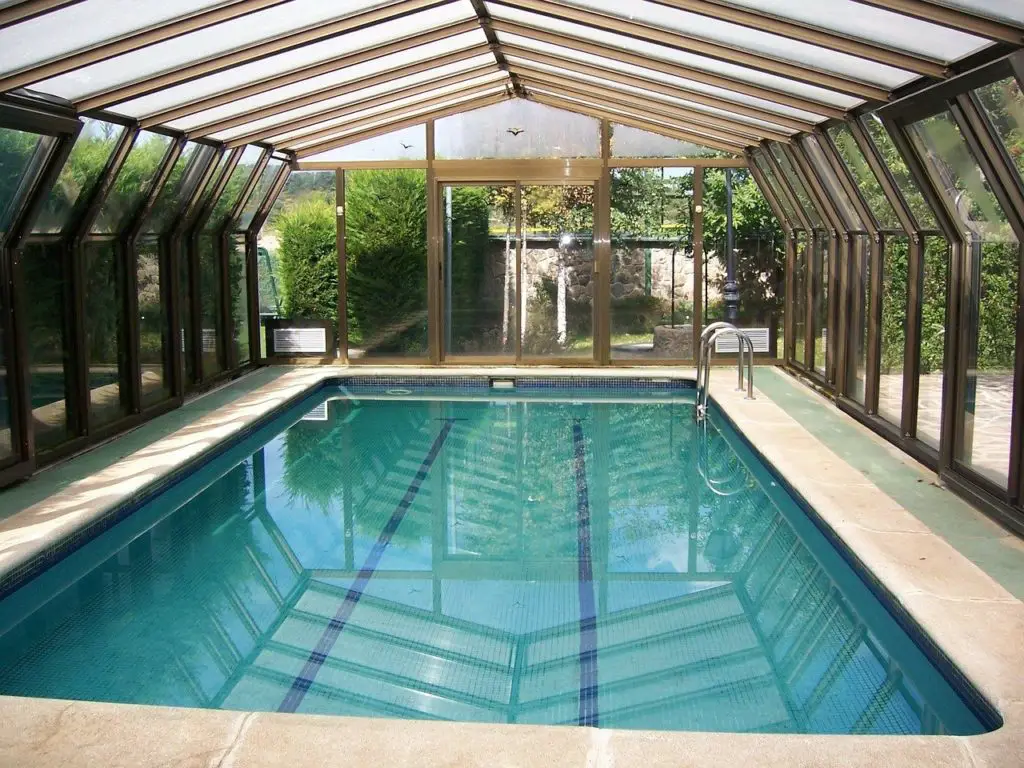
Installation And Maintenance Of Your Swimming Pool Heater
Proper installation and maintenance of your pool heater can optimize its energy efficiency.
It’s best if you hire a qualified pool professional to install the heater, especially its electric hook-up, and to do complex maintenance or repair tasks.
You’ll probably need annual tune-ups. Your pool heater may also need periodic servicing by an AC technician. With proper installation, heat pumps, like most quality pool pumps, can last 10 or more years. If installed improperly, heat pumps may fail after 5 years.
Swimming Pool Heater Checks
Some heat pumps have an optional warranty that covers 2 or 3 years. A simple way to check for leaks is to turn off the main breaker switch and then open all faucets before plugging them back in.
If water runs out when you flush toilets, there may be a leak. Keep track of the number of days the heater was operating this season. Then compare these numbers with previous seasons.
Does the percentage of days operating fall within the expected range? The average outdoor pool heater operates approximately 15 hours a week. You want it running no more than three hours a day.
When the pool is not being used, you don’t want it heating air unnecessarily as it’s a waste of energy. Pool heaters operate at full capacity even when not in use. Some pool heaters have heat defrost features that reduce the risk of ice build-up.
Other pool heaters have thermostatically controlled valves that automatically shut down the circulation fan whenever water is recirculated through the system.
Replacing Your Swimming Pool Heater
The American Pools Association recommends that you replace your pool heater every 7 to 10 years. Check manufacturers’ recommended replacement intervals. This rule applies only to new heat pumps.
Older heat pumps may last indefinitely as long as they’re properly maintained and serviced. It pays to read the product warranty information carefully.
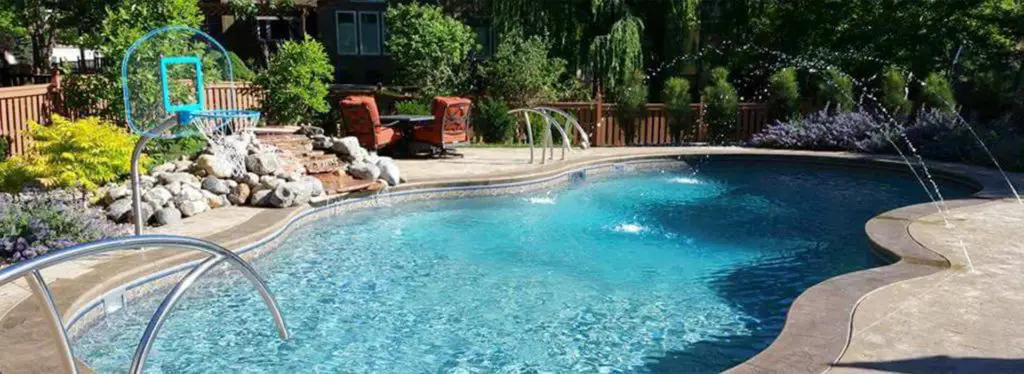
General Swimming Pool Heater Costs To Know
As a rough estimate, a good pool heater will cost $200-$300, depending upon size, quality, and electrical requirements.
You will want to check the cost before making your purchase as it can vary dramatically! Heating costs vary according to local energy rates.
Pool heaters are available in several models ranging from $1,000 to $10,000. They come with varying warranties of up to 20 years. Look for warranties on heat pumps that cover specific periods.
For example, an 8-year warranty means that the pool heater must run between 6 and 8 years without major repairs.
Warranties typically require regular service from a pool professional, but some heat pumps can be repaired without professional help. Check out this handy DIY pool heater repair guide by Medallion Energy!
Always make sure that you know exactly how to repair and maintain your swimming pool heating system if you decide to do it yourself!
How Do Swimming Pool Heaters Work Differently?
Pool heaters work differently than central heating units. Central heating systems depend on the flow of warm air to keep rooms warm.
Because there is very little air movement around a swimming pool — just enough for people to breathe — the air temperature rises slowly. There’s nothing to move cold air away from swimmers, so heat loss from air currents is minimal.
On the other hand, a pool heat pump works like an air conditioner: It draws cool air from outside into the pool where it’s cooled by submerged coils. The cool air is then returned to the outdoors to be circulated throughout the house.
Swimming pool heaters should always be located near a wall of the pool so that air moves directly over the pool surface. That prevents the evaporation of water from cooling the evaporator coil.
Pool heaters use less electricity than gas furnace heaters. The fuel is natural gas; the heat source is electricity.
Many experts recommend installing pool heaters because they provide greater comfort for swimmers, save money on fuel bills, and make your pool easier to clean.
Our Conclusion on How Swimming Pools Are Heated
We hope you enjoyed our comprehensive guide on how swimming pools are heated! Swimming pools can become too hot in the summertime. In most cases, there is no problem with keeping the water in the pool warm. However, if the air surrounding the pool becomes too hot, a swimmer could suffer from heatstroke.
Make sure you know all about the signs of heatstroke so you can prevent this from happening in your swimming pool. It’s very important to keep an eye on your swimming pool heating system year-round.
Having a high-quality and well-maintained heating system in place to keep your swimming pool warm is a great way to ensure that your swimming pool is usable and comfortable even when temperatures drop.
There are many different methods out there to heat your pool, so think about your individual needs before making your purchase.
Remember, some swimming pool heating methods are much more expensive than others so if you are on a budget make sure to carefully read all of the advice above to find a heating system that is both cost-effective and does everything that you need it to do.

Hello, I am a writer and marketing specialist in Kansas City, MO. My love for swimming pools started as a child when I would visit my aunt & uncle’s inground swimming pool on a frequent basis over the summer. Since then I have taught swimming lessons at a Boy Scout Camp, participated in the full setup, installation and maintenance of my father’s inground swimming pool, as well as enjoyed constantly researching everything there is to know about swimming pools for 5+ years. I enjoy all water related sports, being part of the online swimming pool community and always learning new things!
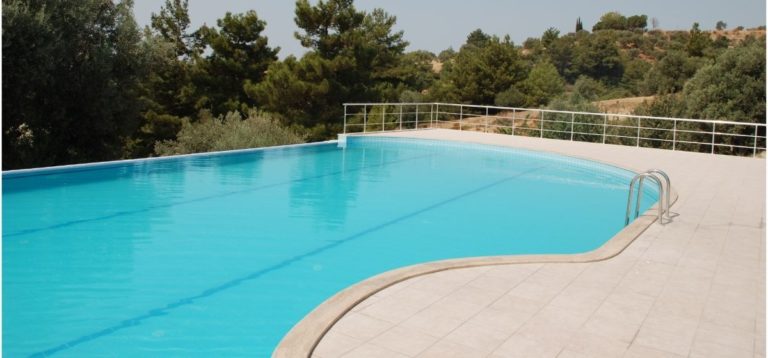
Leave a Reply